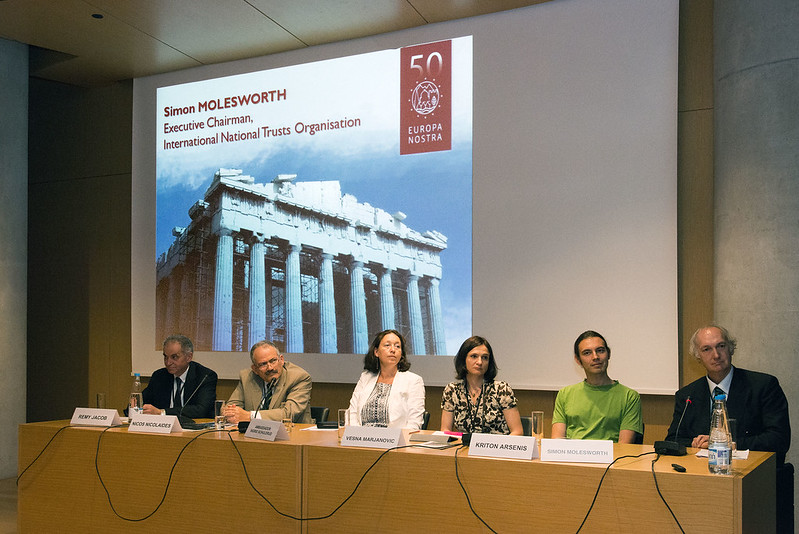Saving Europe’s endangered heritage: the time for action has come
“Reinforce cooperation”, “raise public awareness” and “take action” were some of the main messages conveyed by top-level representatives of European Institutions at a panel discussion on ‘Europe-wide Mobilisation for Saving our Endangered Heritage’, held by Europa Nostra on 16 June at the Acropolis Museum in Athens. The public announcement of the first list of The 7 Most Endangered Monuments and Sites in Europe, made by Europa Nostra and the European Investment Bank Institute on 12 June in the Greek capital, set the stage for the debate.

“Support for heritage conservation falls well within the remit of the EIB. For many years, the EIB has been involved in financing structural projects and cultural heritage has always been part of them. We are therefore pleased to be the founding partner of ‘The 7 Most Endangered’ programme. Together with Europa Nostra and associated partners, the EIB Institute will undertake the necessary efforts to assess the selected sites and to contribute to the development of realistic action plans, in close cooperation with national and local public and private entities,” stated Rémy Jacob, Director General of the EIB and Dean of the EIB Institute.
“By raising awareness about the most endangered monuments and sites in Europe, this excellent programme will create a real momentum for action. I hope that this initiative will reinforce cooperation between public and private stakeholders and lead to longer term partnerships”, affirmed Androulla Vassiliou, European Commissioner for Education, Culture, Multilingualism and Youth in her introductory speech. Commissioner Vassiliou stated that safeguarding and promoting cultural heritage is a high priority for the European Commission and highlighted that the EC is working to develop strong cooperation with the banking sector as well as with the Council of Europe and the European Economic Area (EEA).
“Sharing expertise, joining forces and maximising the synergies between all the actors – experts, public institutions, businesses and civil society – is of crucial importance”, stressed Nicos Nicolaides (Cyprus), Vice-Chairman of the Sub Committee on Culture, Diversity and Heritage of the Parliamentary Assembly of the Council of Europe. “As parliamentarians, we are trying at national and European levels to preserve the rightful place of cultural heritage, a key element for fostering a peaceful, prosperous and united society”, he added.
“Safeguarding cultural heritage is about protecting fundamental European values. Across Europe, from the North to the South, there is this sense that the fundament on which we have built all our relations is cracking. We have a common perspective on what is happening. Now the question is: how can we strengthen this fundament together?”, asked Ingrid Schulerud, Ambassador for the EEA and Norway Grants in the Ministry of Foreign Affairs in Norway. “We are determined that cultural heritage should be a key part of our funding, which 15 EU countries can apply for. We also decided, in an agreement with the European Commission, that at least 10% of our founding should be devoted to civil society”, she explained. “We would like to engage more with Europa Nostra as well as with the European Investment Bank and the Council of Europe Development Bank on different initiatives to defend our cultural legacy. I am pleased to see that Nicosia, the only divided city in Europe, is among The 7 Most Endangered. It really is the time to make an effort to rescue this pearl of Europe’s cultural heritage”, urged Ambassador Schulerud.
Speaking more specifically about Greece, Kriton Arsenis, Member of the European Parliament, said that the economic crisis has had a profoundly negative impact on the cultural sector, drawing particular attention to the large-scale sale of state-owned assets, ranging from stretches of coast to royal palaces and even entire islands (such as the temple of Apollo in Rhodes and the Kassiopi Bay in Corfu), and called upon cultural, environmental and democratic movements “to join forces to protect our heritage, a crucial element for tourism, economic growth and job creation, and for our identity as a country”.
Vesna Marjanovic (Serbia), Member of the Sub Committee on Culture, Diversity and Heritage of the Parliamentary Assembly of the Council of Europe and rapporteur of the report on ‘Europe’s Endangered Heritage’ stressed: “Public awareness of cultural heritage has risen but at the same time the danger to heritage has also increased in recent years”. With the aim of solving this paradox and placing cultural heritage higher on the political agenda, she invited all the panellists and Europa Nostra to contribute to this important report.
“We all share a vision for the protection of cultural heritage but we have to communicate in a cleverer and more engaging way with the widest community possible. I visited the Acropolis with a group of academics and experienced practitioners and we were surrounded by hundreds of people. Like us, they were enjoying those magnificent monuments and they understand the importance of heritage. But how many of them have heard of Europa Nostra or of a heritage organisation in their country? Therefore, I encourage you all to spread your enthusiasm and inspire others to follow you”, pointed out Simon Molesworth, Executive Chairman of the International National Trusts Organisation.
In his concluding remarks, Denis de Kergorlay, Executive President of Europa Nostra, thanked all organisations represented for their support and commitment and expressed the hope that with our combined efforts we shall be able to find solutions for a viable future for many monuments and sites in Europe which are currently in danger.
The panel discussion on ‘Europe-wide Mobilisation for Saving our Endangered Heritage’, which was an integral part of the General Assembly that marked the 50th Anniversary of Europa Nostra, was moderated by its Secretary General, Sneška Quaedvlieg-Mihailović, and attended by 200 people.






